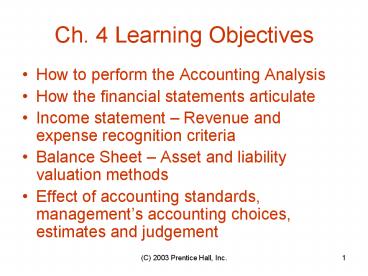Ch. 4 Learning Objectives PowerPoint PPT Presentation
1 / 22
Title: Ch. 4 Learning Objectives
1
Ch. 4 Learning Objectives
- How to perform the Accounting Analysis
- How the financial statements articulate
- Income statement Revenue and expense
recognition criteria - Balance Sheet Asset and liability valuation
methods - Effect of accounting standards, managements
accounting choices, estimates and judgement
2
The Balance Sheet
Presents assets and liabilities
- Assets Liabilities Shareholders' equity
- Shareholders' equity Assets - Liabilities Net
assets
3
Recognition Criteria and Valuation Method
Determination
- GAAP sets balance sheet recognition criteria and
valuation rules
Assets Cash Accounts receivable Marketable
securities Inventory Property, plant,
equipment
4
Recognition and Valuation (continued)
- GAAP sets balance sheet recognition criteria and
valuation rules
Liabilities Accounts payable Accruals Short term
debt Long term debt Contingencies
5
Recognition and Valuation (continued)
Q Why isnt Net Assets (i.e. Equity) the value
of the firm?
GAAP equity value ? market value
Management estimates
Unrecognized assets and liabilities
6
The Income Statement
- is closely related to the balance sheet
- Change in equity Change in net assets
Equity Beginning equity Net income
Dividends New stock
Change in Equity Net income Dividends New
stock
7
The Income Statement Continued
- Lists those items that affected the net income
Revenues
Expenses
Special Items
Gains
Losses
8
The Income Statement Continued
Revenues include
- 1. Increases in net assets from selling goods
and services in the normal course of business.
2. Other income such as interest earned (but not
gains from sales of assets other than inventory).
9
The Income Statement Continued
Revenues include
- 1. Increases in net assets from selling goods
and services in the normal course of business.
2. Other income such as interest earned (but not
gains from sales of assets other than inventory).
How do revenues increase net assets?
What are accrued revenues?
What are deferred revenues?
10
The Income Statement Continued
- Expenses are decreases in net assets from
producing goods and services
Cost of Sales
Advertising
Salaries
Depreciation
Taxes
Rent
How do expenses decrease net assets?
What are accrued expenses ?
What are deferred expenses ?
11
The Income Statement Continued
Gains are like revenues
- They represent increases in net assets
- Gains are not like revenues
- They do not arise in the ordinary course of
business
12
The Income Statement Continued
Losses are like expenses
- They represent decreases in net assets
- Losses are not like expenses
- They do not arise in the ordinary course of
business
13
The Income Statement Continued
- Special Items include
- Extraordinary items
- Changes in accounting principles
- Discontinued operations
What are nonrecurring items and how do they
differ from the Special Items?
14
Accounting Analysis of the Income Statement
- Focuses on earnings quality
- Conservative accounting methods
- Earnings free of manipulation
- Exclusion of extraordinary or nonrecurring items
15
Conservative Accounting Methods
- Lead to lower values for reported net assets
- Lower income in early years
- Increased income in later years
Analysts challenge is to undo accounting
methods (either conservative or aggressive) that
distort underlying economics.
16
Earnings Free of Manipulation
- The analyst should try to undo any management
manipulation before using historical data
17
Exclusion of Extraordinary or Nonrecurring Items
- The analyst can ignore unusual or nonrecurring
items - For example
- Loss from an asset writedown
- Merger expenses
- Gains (losses) on asset sales
- Restructuring costs
18
The Cash Flow Statement
- Reconciles net income to the change
in cash
19
The Cash Flow Statement Cont.
Consists of three sections
Cash flow from operations
Cash flow from investing
Cash flow from financing
20
The Cash Flow Statement Cont.
- Cash Flow from Operations
- Includes items that relate to the determination
of net income
21
The Cash Flow Statement Cont.
- Cash Flow from Investing
- Cash flow from activities in which the firm
acquires or divests long-term assets or
investment securities
22
The Cash Flow Statement Cont.
- Cash Flow from Financing Includes
- Borrowing money
- Repaying debt
- Obtaining funds from stockholders
- Paying dividends
- Repurchasing shares

